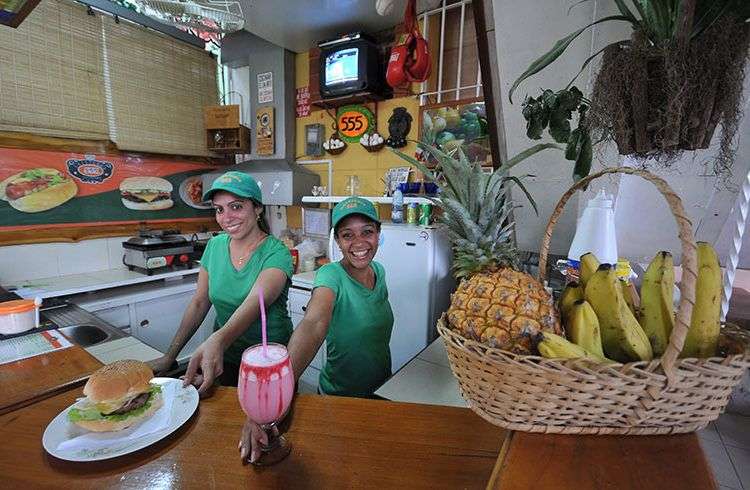One of the main changes being made by the Cuban government is opening up the self-employment sector as a way of decentralizing state activities. This is reflected in the “Economic and Social Policy Guidelines,” known as the “Lineamientos,” which are in effect the economic program of the reform process.
The private sector, which was unstable in the Cuban economy until the 1990s and to a lesser degree until 2008-2009, began to be promoted in 2010 with the approval of 181 authorized activities. And in 2014, this number was increased to 201 (65 more than in 1995).
This opening-up process is different from such developments in the past. Previously, the authorized self- employment categories were conceived as complements to state activity, which limited them. Today, many services are being provided that were not offered (or inadequately) by the state, while others are engaging in open (and sometimes unequal) competition with state companies.
In addition, a large layer of the self-employed are workers employed by small businesses, which adds two more differences: the ability to exploit labor, and the appearance of a higher organizational form, equivalent to small private businesses (still without legal status).
Most “popular” activities, in descending order:
employee
sales and elaboration of food
transportation
housing rental
Private Sector in Havana
Havana, with 2,106,146 inhabitants, according to the 2012 Census, is Cuba’s most populated province. Havana, Matanzas, Villa Clara, Camagüey, Holguín and Santiago de Cuba account for 65 percent of all private workers, and the capital leads with approximately 26 percent of the total 458,000 registered self-employed workers nationwide.
Sources of workers: 80,660 previously unemployed (62.3%); 19,862 state workers (15.3%); 15,929 retirees (12.3 %); 520 students (0.4 %); 63 “available” workers (laid off).
Education level: 12th grade (61%), 9th grade (29%), university (8%). Approximately 32 percent of the self- employed are 16 to 35 years old. The category that includes the highest number of young people is employee.
LEGAL REGULATIONS
Resolution 353, passed by the Ministry of Finances and Prices, provides for special modifications to the regulation of self- employment by Law 113, passed in 2012, adding the following activities:
Auto body worker
Producer/vendor of marble articles
Ironworker
Blacksmith
Flamecutter Producer/vendor of aluminum articles
Producer/vendor of non-ferrous cast articles
Floor polisher
Wholesale vendor of agricultural products (Mayabeque, Artemisa and Havana)
Retail vendor of agricultural products (Mayabeque, Artemisa and Havana)
Postal agent Telecommunications
(Source: Gaceta Oficial, No.27, Havana, 2013.)
As published in Issue 029/2013 of The Official Gazette, an economic management system has been established for renting locales to private food service workers, authorizing:
Producer/vendor of food and beverages for gastronomic services in restaurants (paladars) Producer/vendor of food and beverages at fixed points (cafeterias) Cafeterias for light snacks Another relevant legal regulation is the recently-published Labor Code.
Its Article 74 obliges private-sector employers to guarantee: a) An eight-hour workday. On certain days of the week, the workday can be one hour longer, as long as the limit of 48 hours weekly is not exceeded;
b) Remuneration that is not less than the minimum wage, which according to non-official sources is about 250 pesos, in proportion to real work time;
c) One day of rest weekly and seven natural days of annual paid vacation, as a minimum; and
d) safety and health conditions on the job
Final Reflections
An initial examination of self-employment in Cuba today turns up at least two problems related to institutional strength and the possibility of applying oversight in this sector. The first is tax evasion, and is related to current law.
Such a compressed scale for passing from one tax category to the next, in the case of personal income tax (as of 10,000 pesos, the tax is 15 percent, and for income of over 50,000 the tax is 50 percent), encourages underreporting in the context of inefficient oversight of the inputs utilized. Moreover, this negatively impacts the expectations of those who are tempted to become private workers and those who already are.
Likewise, the self-employed who do not earn high income should be taken into account. This problem goes hand in hand with the absence of a wholesale market for buying non-agricultural inputs. Even farm products are not easy to trace, given the nonexistence of receipts or stable supply contracts.
This places private workers in a difficult position vis-à-vis state inspectors, and leads to hefty fines. Financial support institutions for entrepreneurs still do not exist, and this connects with an insufficient, incoherent credit policy, which can be seen in the insignificant number of loans granted to self-employed workers in Havana: just 29 as of December 2013.
Heavy competition between state and private financing is also occurring. The latter is taking place in the informal market, with non-domestic sources that in many cases evade tax authorities.
This market emanates from two fundamental sources: from abroad—generally in small amounts and related to family assistance, directed at very small specific sectors—and from domestic sources: people who accumulated large sums of money over the last 20-25 years of a lax fiscal situation, and who provide loans at relatively low rates (4 to 7 percent) without demanding guarantees, an involving solely a moral contract, with the corresponding consequences of non- payment. Lastly, a wholesale market cannot be created simply by importing most supplies.
Its stock must be generated by state enterprises surplus once state orders have been filled. While the legal mechanism has been created for a relationship between state companies and self-employed workers, institutional obstacles exist such as the fact that state companies can contract up to a certain number of self-employed workers, or that the self-employed can use state companies in the provision of their services or goods, articulating a chain of production.
There are also psychological barriers: company directors who view the private sector as a generator of capitalist production relations. One final point relates to what the new Labor Code stipulates in its section on the private hiring process between employer and employee. Given the country’s de- institutionalization, it is very complicated for a hired worker to demonstrate incorrect procedures by his or her employer. Urgently needed are offices, private or state-run, that can efficiently address these issues and effectively represent the interests of the growing national private sector










